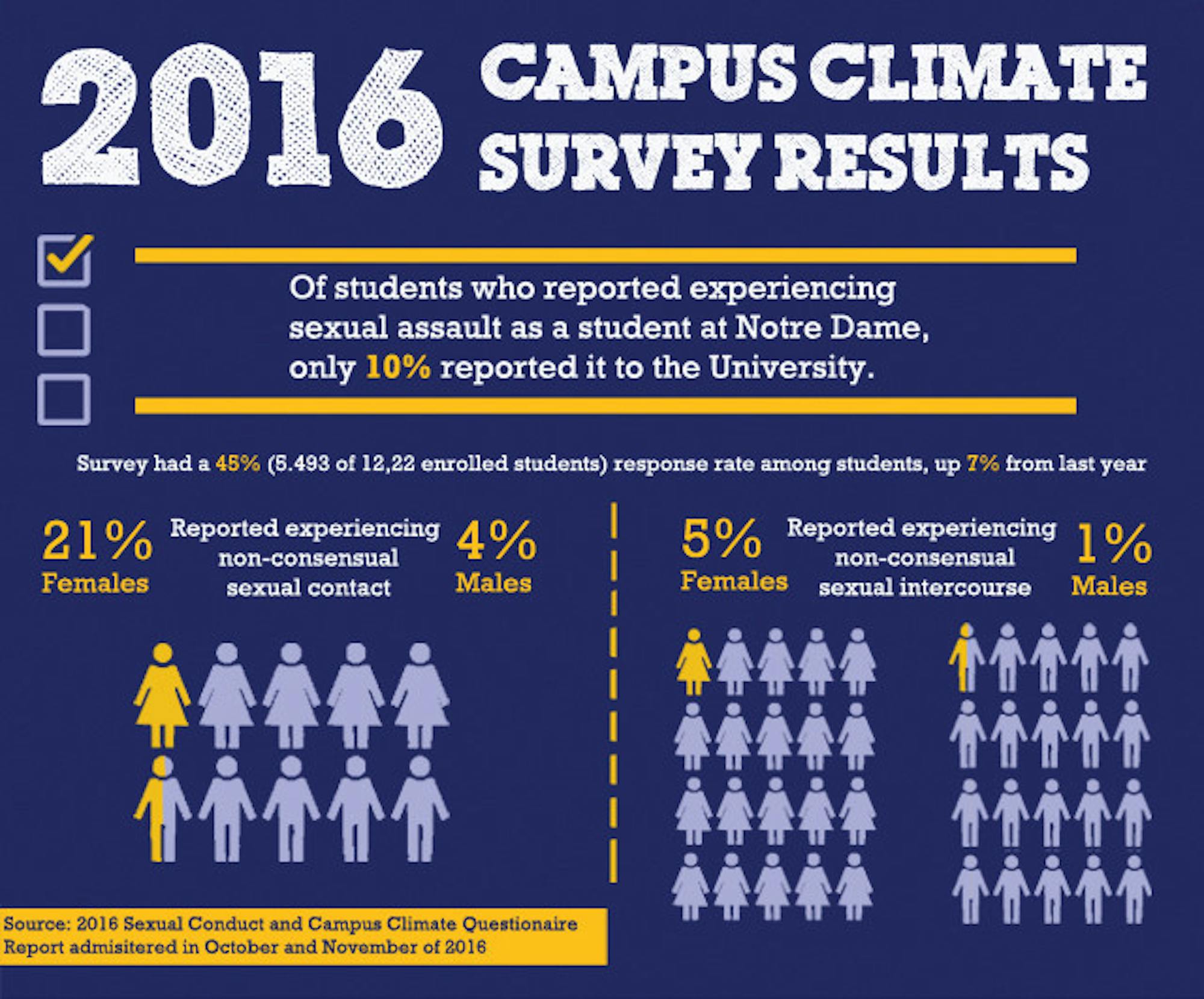
The University released the results of its 2016 Campus Climate Survey on its Title IX website Wednesday afternoon, providing data and insight on student perceptions of sexual violence at Notre Dame and corresponding University policies.
The survey, administered by the University’s Office of Strategic Planning and Institutional Research, seeks to “help assess the knowledge, perceptions and experience of Notre Dame students in relation to sexual assault, other sexual misconduct, dating and domestic violence, stalking and other conduct that creates a sexually hostile environment,” according to a list of frequently asked questions accompanying the 39-page survey report.
This year’s questionnaire, conducted in October and November of 2016, was the third administered by Notre Dame. Surveys on campus climate were also administered in 2012 and 2015.
According to the report, the survey, which was administered to all enrolled Notre Dame undergraduate and graduate students, had a completion rate of 45 percent — 42 percent amongst males and 49 percent amongst females — which is up 7 percent from last year.
Five percent of female respondents and 1 percent of male respondents reported experiencing non-consensual sexual intercourse (defined as “any sexual intercourse without your consent; it includes oral, anal or vaginal penetration, to any degree, with any object”) while a student at Notre Dame — a “deeply troubling” number, according to the accompanying survey results overview released by the Office of Student Affairs.
“Even one instance of harm to a member of our community is too many, and Notre Dame will continue to adopt policies and develop programs designed to reduce these incidents,” the overview said.
Additionally, 21 percent of female respondents and 4 percent of male respondents said they had personally experienced other forms of non-consensual sexual contact. Fourteen percent of all students reported experiencing some form of non-consensual sexual intercourse or non-consensual sexual contact while a student at Notre Dame — a figure down 2 percent from last year’s survey.
Most students — 91 percent of all respondents — at least somewhat agreed that they are aware of ways to intervene if a situation had potential for sexual assault, a 10 percent increase from the 2015 survey.
In its examination of the sexual assault reporting process, the survey found that 65 percent of respondents said they were aware they may pursue a complaint through the University conduct process and/or pursue a criminal complaint.
Of the students that reported experiencing sexual assault while a student a Notre Dame, only 10 percent reported the incident to the University, citing “wanting to forget about it” (59 percent), doubts that reporting would solve anything (54 percent), not wanting to go through the University process (53 percent) and self-blame for the incident (51 percent) as major barriers preventing reports.
“Student responses to the personal experience questions suggest that Notre Dame, like other institutions, experiences underreporting of sexual assault and sexual misconduct,” the Student Affairs overview said. “The University remains committed to alleviating barriers to reporting and encouraging students to report any of these instances.”
While 58 percent of respondents said Notre Dame’s response to sexual assault, other sexual misconduct, dating or domestic violence, stalking and other conduct that creates a sexually hostile environment was very or mostly effective, 42 percent of respondents said the response was somewhat effective or not effective at all.
Additionally, in regards to campus safety, only 52 percent of respondents said they were aware of and knew how to use SafeBouND — the University's safe walk service — while only 39 percent of respondents said they were aware and knew how to use an emergency phone on campus.
The Committee for Sexual Assault Prevention (CSAP) will review the results and issue formal recommendations to Erin Hoffmann Harding, vice president for student affairs, according to the survey overview.













